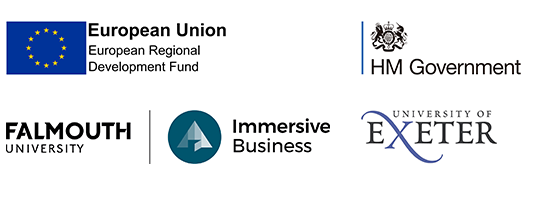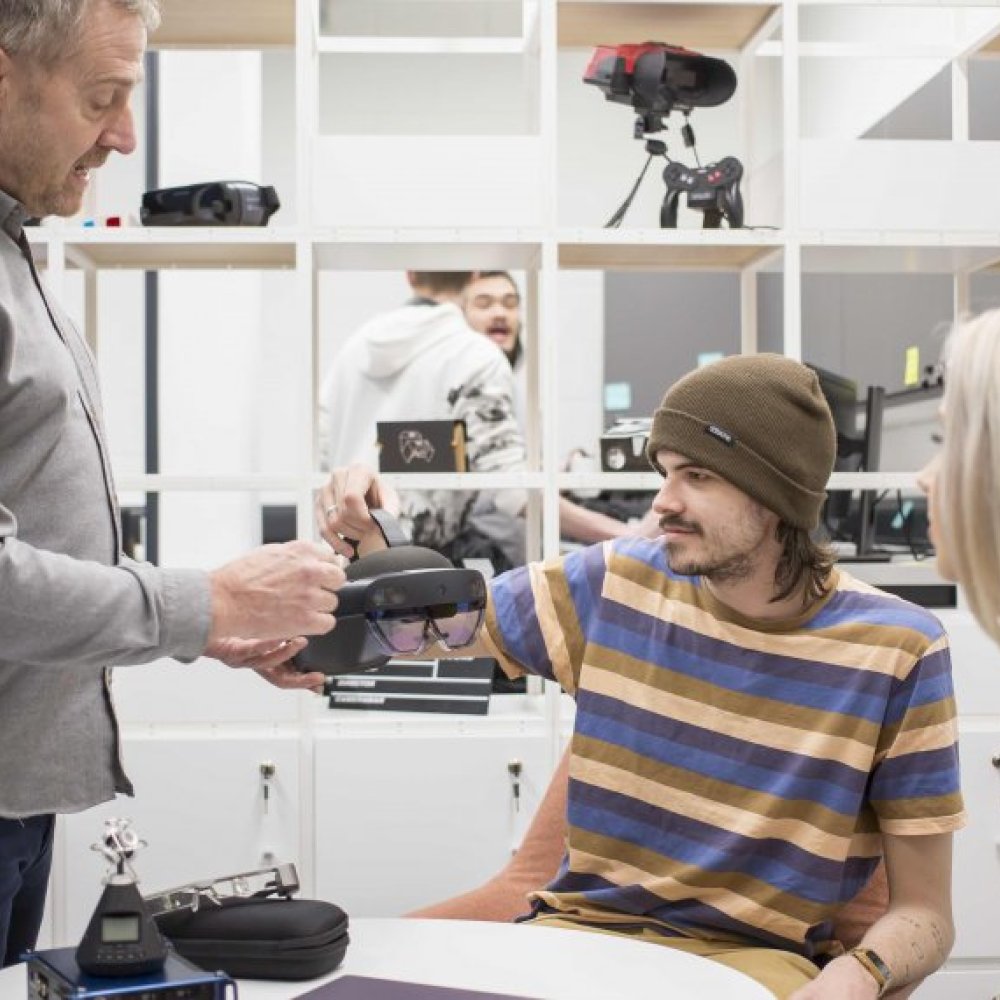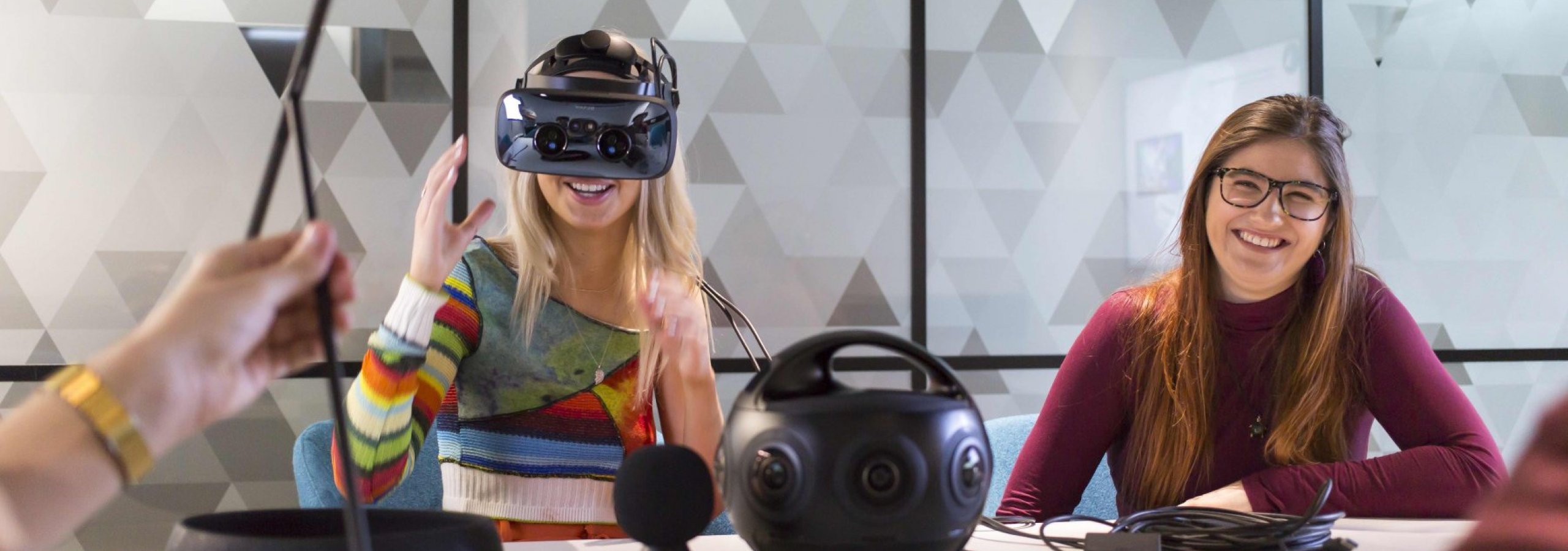Project details
| Project lead | Professor Tanya Krzywinska |
|---|---|
| Centre alignment | Centre for Blended Realities |
| Start date | April 2020 |
| End date | June 2023 |

The Immersive Business project was a three-year business support programme part-funded by the European Regional Development Fund and delivered in partnership with the University of Exeter.
The overall aim of the project was to support SMEs in Cornwall and Isles of Scilly to apply immersive and innovative technologies to improve competitiveness both nationally and globally. In addition to technical support the project has established a state-of-the-art immersive technology facility which provides the opportunity for participants to gain the skills and expert knowledge required to apply the technologies to their sectors.
Project team
The Immersive Business project team included:
-
Professor Tanya Krzywinska (Project Lead)
-
Georg Finch (Immersive Technical Specialist)
-
Rose Goodship (Business Development Fellow)
-
Olivia Toms (External Funding Officer)
-
Matt Eyre (Project Management Group Member)
-
Johnny Pope (Immersive Technical Specialist)
-
Grant Day (Business Development Fellow)
Project aim
It was recognised that businesses in the Cornwall and Isles of Scilly area, particularly SMEs, do not have sufficient information or knowledge of the risk and return when it came to investing in new technologies, which can be detrimental to their business growth as well as wider regional and national economies. In response, the Immersive Business project sought to help SMEs invest in innovation by giving them the tools and knowledge to be able to develop their business with immersive technologies to improve their market competitiveness both nationally and globally and deliver new to the firm products. It provided access to a new Immersive Technologies facility which contained the necessary equipment and space for SMEs to network and to explore the technologies.
Beneficiaries of the Immersive Business project were able to access and benefit from technologies such as virtual reality (VR), augmented reality (AR) and mixed reality (MR). These types of technologies enable the user to interact and encounter 3D objects through simulated environments, project computer-generated images onto the user’s view of the real world as well as combining elements of reality and virtual reality to observe how they would play out in a real setting.
The Immersive Business facility:
The Immersive Business facility, based on Penryn Campus on the former Design Centre site, continues to build on this project’s legacy and offers a unique space that houses some of the latest tools and immersive technology. The facility provides an extended reality (XR) single, multiuser, remote and collaborative immersive workspace to experience first-hand, plus opportunities for knowledge exchange from experts.
Businesses were supported through one of two routes:
- A lighter-touch training and development programme of activity which equipped beneficiaries with the skills and knowledge to access immersive toolkits to develop their own solutions.
- An intensive product development project which enabled beneficiaries to work with the specialists to co-create new-to-firm products based on commercial demand.
The project aligned with both national and subnational policies relevant at the time of its design, including ‘Industrial Strategy – Building a Britain Fit for the Future’ and ‘Vision 2030 – The CIoS LEP’s Strategic Economic Plan’, both of which focused on driving the economy. The economic context for the project included the high growth in the number of businesses in CIoS LEP in recent years, low GVA per person employed, and an unemployment rate following national trends.

Outcomes & outputs
The programme supported 70 businesses in exploring applications of the technology and 25 new immersive products and processes were created.
Key Achievements:
-
Addressing barriers to immersive technologies: The project provided training, equipment access, and expert guidance to lower barriers for SMEs to access the required technological knowledge and skills to innovate and expand.
-
Improved product/service range and quality: Businesses developed new offerings and enhanced existing ones, leading to increased sales and competitiveness.
-
Investment in innovation: The project catalysed investment in immersive technology by SMEs, fostering a culture of innovation.
-
Reduced carbon emissions: Some businesses adopted immersive solutions that could reduce travel and other negative environmental impacts.
-
Community building: The project fostered a community of immersive technology users, academics, and technicians, facilitating collaboration and knowledge sharing.
-
As a physical hub, the Immersive Business facility, which provided an important identity for the project, acted as a knowledge exchange hub to host networking opportunities between SMEs. Additionally, it has been used to host significant regionwide and national events such as elements of the ‘Plug into the Metaverse’ conference in February 2023 which attracted a wide range of stakeholders and businesses all focused on raising the digital profile and presence of businesses in CIoS.
Funders
The project received a total of £1,580,565 from the European Regional Development Fund.

Impact & recognition
The evaluation shows that Immersive Business is forecast to create 87 net additional jobs by 2025 and over £12,000,000 in net additional GVA by 2030.
Beneficiary SMEs who had participated in the project increased sales both within and outside Cornwall as a result of their participation, being able to diversify their product or service, improving the quality of their products or services, and investing further in innovation or an innovation support programme.
Partners
Falmouth University partnered with University of Exeter who were able to bring in different networks of businesses to the project as well as additional academic and technical expertise to support their needs, for example in the areas of mining and marine. A strong working partnership was established between Falmouth University and University of Exeter who together provided match funding for the ERDF-funded project.
